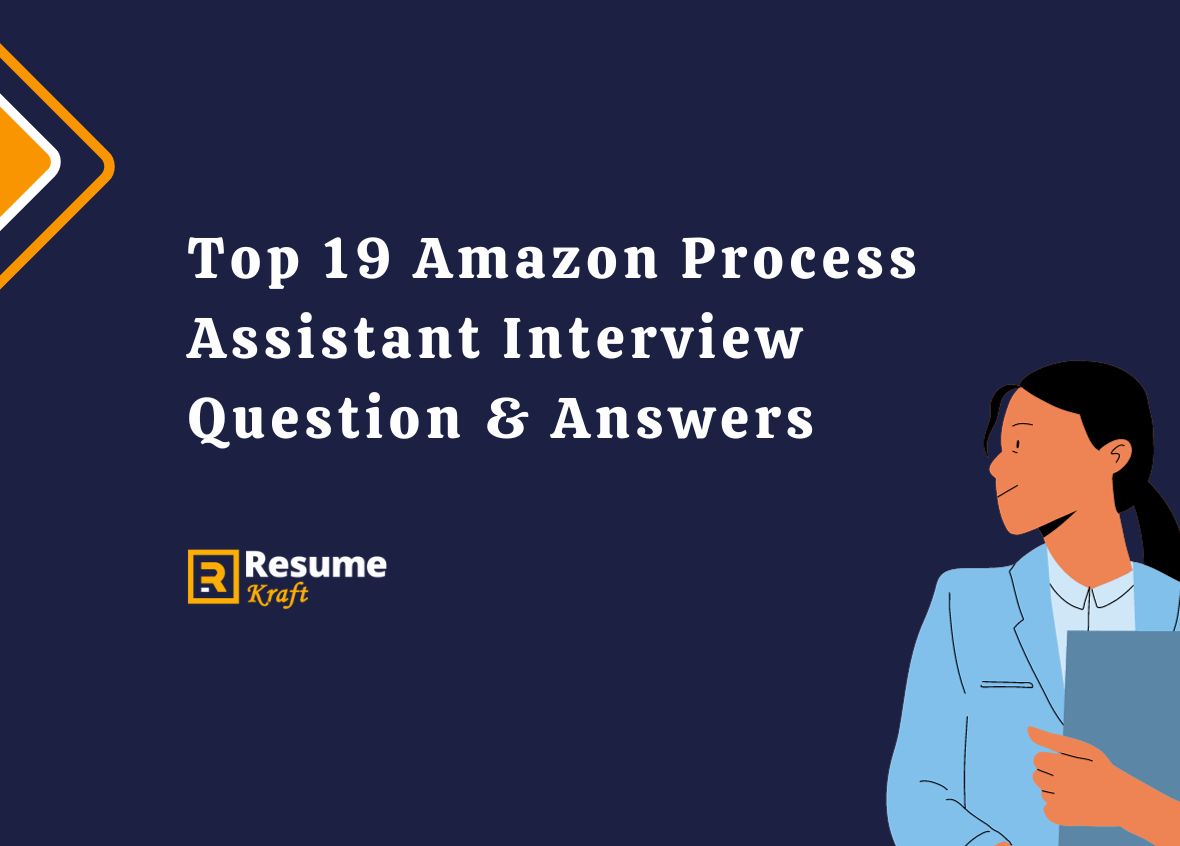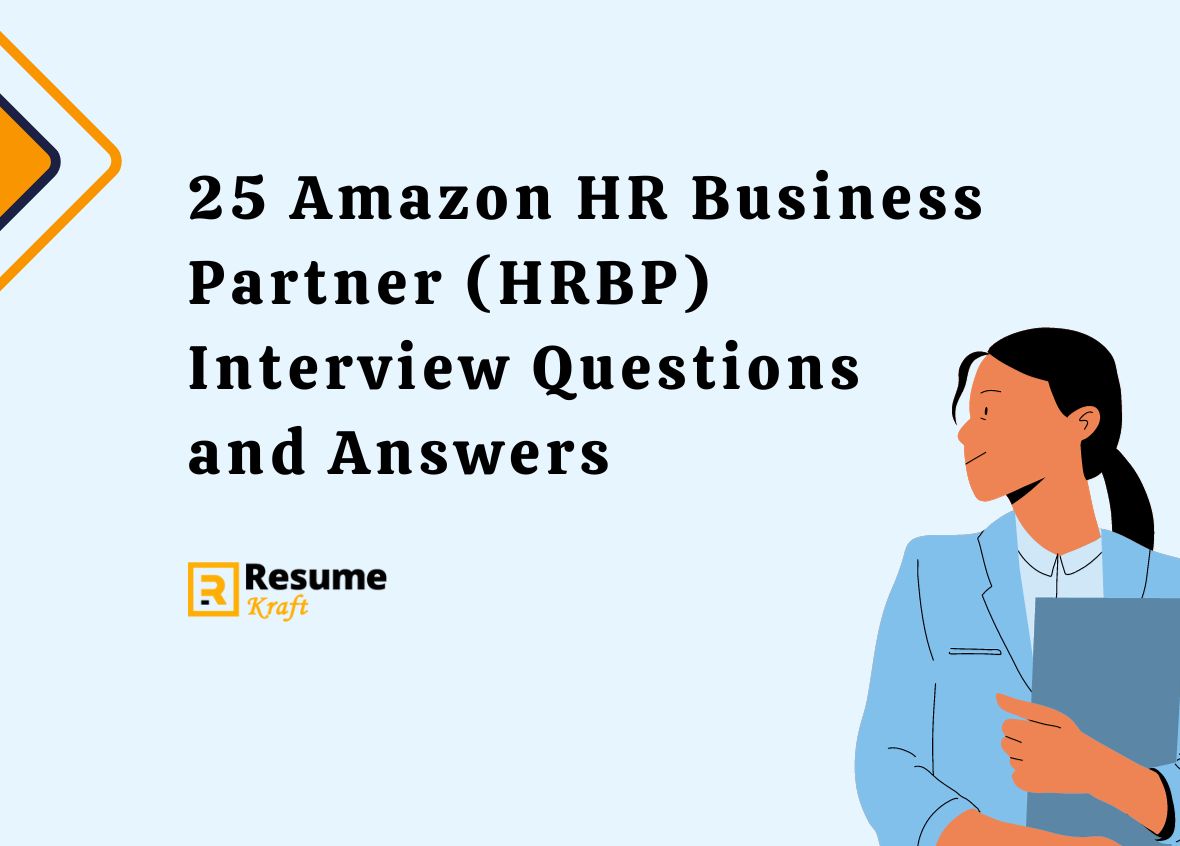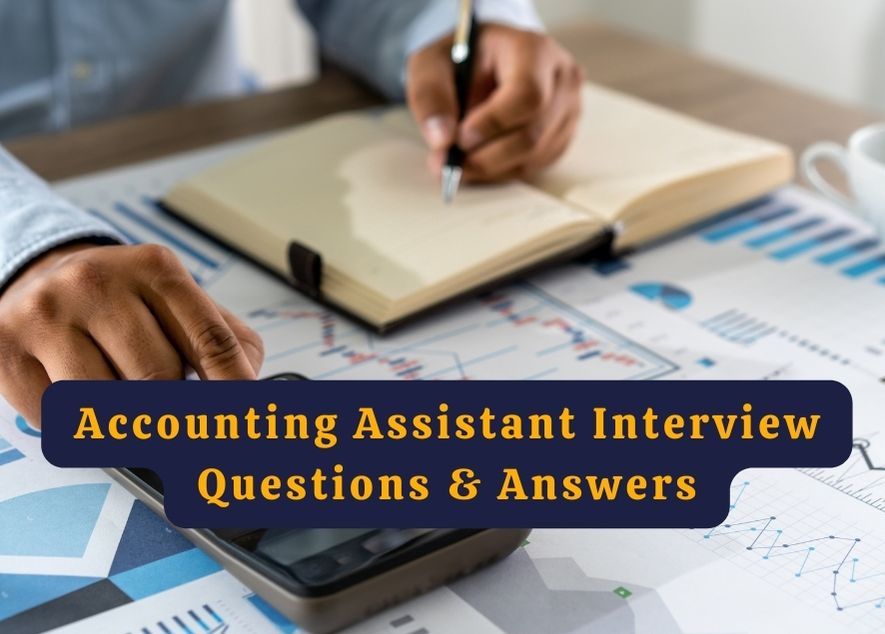
Top 19 Amazon Process Assistant Interview Question & Answers
You’ve spent days polishing your resume, tailoring your cover letter, and sending out job applications like there’s no tomorrow. Finally, you get that magical email from Amazon inviting you for a Process Assistant interview. That’s huge! But now, a different kind of work begins: preparing for the big day. This article is designed to be your GPS through the labyrinth of the Amazon Process Assistant interview process.
The role of an Amazon Process Assistant is both unique and crucial. It involves overseeing the daily tasks of your assigned area, supervising hourly associates, and acting as the middleman between frontline associates and management. Landing this job means you’ve got your foot in the door of a global retail giant, and that’s not a small feat. So, to help you put your best foot forward, this article is jam-packed with the 19 most common questions you’re likely to face, complete with sample answers and expert tips.
- Top 19 Amazon Process Assistant Interview Questions and Answers (with samples)
- What Is Your Understanding of the Role of an Amazon Process Assistant?
- Why Do You Want to Work for Amazon?
- How Would You Handle a Conflict Between Two Team Members?
- Describe a Time You Went Above and Beyond for a Customer or Client.
- How Do You Prioritize Tasks in a Fast-Paced Work Environment?
- Tell Me About a Time You Had to Adhere to a Policy You Didn’t Agree With.
- How Do You Handle Stressful Situations?
- What Would You Do If You Noticed an Associate Not Following Safety Procedures?
- How Would You Motivate a Team That’s Falling Behind on Goals?
- How Do You Handle Constructive Criticism?
- Why Should We Hire You for This Position?
- What Is Your Approach to Problem-Solving?
- How Would You Deal With an Underperforming Team Member?
- How Do You Manage Time and Prioritize Tasks During Peak Seasons?
- What Are Amazon’s Leadership Principles, and Which One Resonates Most with You?
- Can You Give an Example of a Situation Where You Had to Adapt to Change?
- How Would You Describe Your Communication Style?
- How Would You Handle a Disagreement with Your Supervisor?
- Conclusion
- Top 19 Amazon Process Assistant Interview Questions and Answers (with samples)
- Conclusion
Top 19 Amazon Process Assistant Interview Questions and Answers (with samples)
If you’ve got this far, chances are you’re keen on acing your Amazon interview. Knowing the kind of questions you’ll be asked can be a game-changer. So, we’ve compiled this comprehensive list to help you prep. Without further ado, let’s get started!
What Is Your Understanding of the Role of an Amazon Process Assistant?
This question is often used as an ice-breaker but don’t take it lightly. Amazon wants to see if you’ve done your homework. Understanding the role means you’re not only serious about the job but also that you’re likely to be a good fit.
Sample Answer
“The role of an Amazon Process Assistant involves overseeing specific areas within the warehouse or fulfillment center. It’s about facilitating smooth day-to-day operations, ensuring that hourly associates are on task, and serving as a liaison between associates and higher-level management. It requires strong leadership skills, problem-solving capabilities, and the ability to adapt in a fast-paced environment.”
Why Do You Want to Work for Amazon?
Your answer to this question reveals your motivation for wanting to be part of Amazon. It’s an opportunity to show how your career goals align with Amazon’s company culture and mission.
Sample Answer
“I’ve always been impressed by Amazon’s relentless focus on customer satisfaction and innovation. I see Amazon not just as a retail giant, but as a technology company at its core. Working here would allow me to contribute to a culture of excellence and innovation, and I find that incredibly exciting.”
How Would You Handle a Conflict Between Two Team Members?
Conflict is inevitable in any workplace setting. Amazon is interested in knowing how skilled you are in conflict resolution and maintaining a harmonious work environment.
Sample Answer
“Firstly, I would separate the parties involved and speak to each one individually to get their side of the story. Once I have a better understanding of the situation, I would bring them together to discuss a solution, making sure both feel heard and valued. If the conflict persists, I would escalate it to higher management, but only as a last resort.”
Describe a Time You Went Above and Beyond for a Customer or Client.
This question aims to gauge your commitment to customer service—a core value for Amazon. Your ability to exceed customer expectations can set you apart from other candidates.
Sample Answer
“At my previous job in retail, a customer was searching for a specific item that we had just run out of. Rather than turning them away, I took the initiative to call other nearby stores. I located the item and arranged for it to be held for the customer. I also offered them a discount voucher for the inconvenience. The customer was thrilled and became a regular.”
How Do You Prioritize Tasks in a Fast-Paced Work Environment?
Amazon’s work environment is highly dynamic. This question assesses your ability to manage tasks efficiently under pressure.
Sample Answer
“In a fast-paced environment, it’s essential to have a clear understanding of task priorities. I generally categorize tasks into ‘urgent and important,’ ‘important but not urgent,’ and ‘neither.’ I tackle the urgent and important tasks first to ensure nothing falls through the cracks. I also make use of productivity tools to keep track of deadlines and responsibilities.”
Tell Me About a Time You Had to Adhere to a Policy You Didn’t Agree With.
This question tests your ability to follow company rules and policies, even when you may not necessarily agree with them. It also gives insight into your professionalism.
Sample Answer
“In a previous role, the company decided to cut overtime pay as a cost-saving measure. While I didn’t agree with the policy, I understood that decisions were made with the company’s best interests in mind. I adhered to the new rule and encouraged my team to focus on efficiency during regular hours. It was challenging but also a learning experience in team management.”
Build your resume in just 5 minutes with AI.

How Do You Handle Stressful Situations?
Stress is part and parcel of any job, and Amazon wants to know if you can handle it effectively without compromising on performance.
Sample Answer
“When I find myself in a stressful situation, I take a moment to step back and assess the issue at hand. I prioritize tasks and delegate when necessary. Stress is often a result of feeling overwhelmed, so breaking the problem into smaller, manageable tasks helps me regain control. I also believe in maintaining a work-life balance to manage stress in the long term.”
What Would You Do If You Noticed an Associate Not Following Safety Procedures?
Safety is paramount in any Amazon facility. This question evaluates your commitment to maintaining a safe work environment and how proactive you would be in correcting unsafe behaviors.
Sample Answer
“Safety is a collective responsibility, and it’s crucial to address any lapses immediately. I would approach the associate privately and remind them of the importance of following safety procedures, outlining the risks involved in not doing so. If the behavior continues, I would report it to higher management as it jeopardizes the safety of the entire team.”
How Would You Motivate a Team That’s Falling Behind on Goals?
This question aims to examine your leadership skills and your ability to inspire and mobilize a team, especially when things aren’t going as planned.
Sample Answer
“If my team is falling behind on goals, the first step would be to identify the root cause. I would then call a team meeting to openly discuss the challenges we’re facing. By involving the team in the problem-solving process, I can tap into collective insights. I’d also reiterate our initial objectives and celebrate small wins to boost morale. If necessary, I would seek additional resources or adjust deadlines, always ensuring that the team feels supported, not blamed.”
How Do You Handle Constructive Criticism?
The ability to accept, handle, and grow from constructive criticism is a mark of professional maturity. Amazon wants to know how receptive you are to feedback and how you use it to improve.
Sample Answer
“I welcome constructive criticism as an opportunity for growth. The key is to listen attentively without getting defensive. After receiving the feedback, I evaluate its merit and determine how best to implement it into my work. Criticism, when constructive, accelerates personal and professional growth, and I am always eager to improve.”
Why Should We Hire You for This Position?
This is your chance to summarize your qualifications for the role and emphasize why you’re the ideal candidate. It’s a platform to showcase what you bring to the table.
Sample Answer
“I bring a unique blend of skills that are particularly well-suited to the Process Assistant role at Amazon. With my background in logistics and team management, I understand the need for efficiency and effective communication in a fast-paced environment. I also have a proven track record of leading teams to achieve KPIs while maintaining a positive work environment. My ability to adapt, coupled with my passion for innovation, makes me a strong candidate for Amazon’s culture of excellence.”
What Is Your Approach to Problem-Solving?
Problem-solving is an essential skill for any role, but especially crucial for a Process Assistant who is often at the frontline of operations.
Sample Answer
“My approach to problem-solving is systematic. I start by identifying the issue and gathering all pertinent information. Next, I evaluate the potential solutions, considering the pros and cons of each. Once I choose the best course of action, I implement it while continuously monitoring its effectiveness. If needed, I adjust the solution until the problem is fully resolved.”
How Would You Deal With an Underperforming Team Member?
Leadership isn’t just about maximizing productivity; it’s also about people management. Amazon is keen to see how you balance empathy with accountability.
Sample Answer
“If a team member is underperforming, I’d initiate a private conversation to understand any challenges they’re facing that might be impacting their performance. Based on that conversation, I’d offer constructive feedback and outline the steps for improvement. If the underperformance persists, I’d consider reassigning tasks or, as a last resort, involving higher management. The ultimate aim is to empower team members to improve, rather than to chastise.”
How Do You Manage Time and Prioritize Tasks During Peak Seasons?
Peak seasons are busy and stressful times in Amazon fulfillment centers. This question assesses your ability to manage stress, time, and productivity during high-pressure situations.
Sample Answer
“During peak seasons, it’s all hands on deck. Prioritizing becomes critical. I start by identifying the most urgent and important tasks and ensure they are dealt with promptly. I also utilize digital tools to keep track of progress and deadlines. Furthermore, I believe in transparent communication during these times, so everyone is clear on their roles and responsibilities. The goal is to maintain operational efficiency without sacrificing quality.”
What Are Amazon’s Leadership Principles, and Which One Resonates Most with You?
Amazon’s Leadership Principles are integral to its culture. Knowing them not only shows you’ve done your homework, but it also gives you a chance to align your own values with those of the company.
Sample Answer
“Amazon has 14 Leadership Principles that guide its employees’ actions and decisions, including ‘Customer Obsession,’ ‘Ownership,’ and ‘Invent and Simplify,’ among others. The one that resonates most with me is ‘Learn and Be Curious.’ I’ve always had an insatiable appetite for knowledge, and I believe that continuous learning is crucial for personal and professional growth.”
Can You Give an Example of a Situation Where You Had to Adapt to Change?
Change is a constant in the corporate world, especially at Amazon. This question probes your flexibility and adaptability.
Sample Answer
“In my previous job, our company underwent a major reorganization. My department was merged with another, and we had to adapt to new management and different work processes. Initially, it was challenging, but I took it as an opportunity to learn and grow. I adapted by being open to new ways of working, proactively learning about the new department’s procedures, and contributing ideas to streamline the transition.”
How Would You Describe Your Communication Style?
Effective communication is vital in any job, but especially in a role that requires you to liaise between different levels within an organization.
Sample Answer
“I would describe my communication style as clear, concise, and approachable. Whether it’s giving directions to team members or presenting ideas to management, I believe in getting straight to the point while being respectful and open to feedback. Effective communication is a two-way street, and I always strive to be both a good speaker and an active listener.”
How Would You Handle a Disagreement with Your Supervisor?
Professional disagreements are inevitable. This question gauges your conflict-resolution skills and professionalism.
Sample Answer
“If I were to disagree with a supervisor, I would approach the situation delicately and professionally. I’d wait for an appropriate time and setting to discuss the matter openly but respectfully. My focus would be on the issue at hand and not on personalities. I’d prepare my points in advance and also be open to listening to their perspective. The goal is to reach a mutual understanding and find a solution that benefits the project and the team.”
Conclusion
By preparing for these questions and answers, you’re well on your way to becoming a potential Amazon Process Assistant. Your readiness not only showcases your qualifications but also demonstrates your eagerness and commitment to becoming a part of Amazon’s culture of customer obsession and operational excellence. So go ahead, walk into that interview room with your head held high and your answers ready. Best of luck in your journey ahead!
Utilize resources like AI Resume Builder, Resume Design, Resume Maker, Resume Samples, Resume Examples, Resume Skills, Resume Help, Resume Synonyms, Career Advice, Interview Questions, and Job Responsibilities to enhance your preparation.

Build your resume in 5 minutes
Our resume builder is easy to use and will help you create a resume that is ATS-friendly and will stand out from the crowd.











